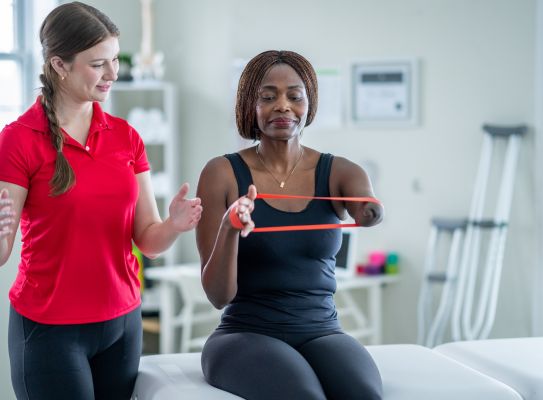Post-Operative Physiotherapy: Your Road to Recovery
Empowering Your Recovery Journey: Post-Op Physiotherapy Explained
Welcome to our comprehensive guide on post-op physiotherapy. This guide outlines essential strategies to optimize your recovery journey after surgery. Prioritizing Post-Operative Rehabilitation Physiotherapy to regain strength, mobility, and functionality is crucial. Our team of expert physiotherapists in Surrey and Abbotsford is here to support you every step of the way.
The Importance of Post-Surgical Rehabilitation
Post-surgical rehabilitation is essential to the recovery process as it assists in re-establishing joint movement, rebuilding muscle strength, and enhancing tissue healing. Rehabilitation’s primary objective is to restore full function following surgery. At Revive Rehab Centre, our experienced physiotherapists provide one-on-one expert care in private rooms to guide you on this journey to recovery.
What to Expect After Surgery: Physiotherapy Insights
Understanding the Importance of Early Mobilization
Early mobilization is crucial to prevent complications and promote faster recovery. Our customized post-op physiotherapy active rehab programs concentrate on gentle exercises and movements to improve circulation, lessen stiffness, and avoid muscle atrophy.
Pain Management Strategies Tailored for Post-Surgical Patients
We take pain management seriously after surgery. Our post-op physiotherapy team uses a multidisciplinary approach, combining manual therapy, modalities, shockwave therapy, and patient education to manage pain and discomfort effectively.

Building Strength Safely: Exercise Protocols Post-Surgery
Rebuilding muscle strength, improving endurance, and restoring functional abilities is a gradual process that requires patience and guidance. Our personalized exercise protocols help you achieve these goals safely and effectively.
Regaining Range of Motion: Techniques and Exercises
It is expected to lose range of motion after surgery. However, through targeted post-op physiotherapy interventions, it is possible to regain flexibility and mobility. Our team uses a variety of techniques, including stretching exercises, joint mobilizations, and proprioceptive training, to help improve your range of motion and promote joint health.
Addressing Scar Tissue: Manual Therapy Approaches
Scar tissue formation is a natural part of the healing process. Still, it can sometimes lead to stiffness and restricted movement. Our experienced physiotherapists in Abbotsford and Surrey utilize manual therapy techniques such as massage, myofascial release, and scar tissue mobilization to minimize adhesions and improve tissue flexibility.
Healing Journey: Post-Operative Rehabilitation Physiotherapy
At Revice Rehab, we are committed to empowering your recovery journey through personalized post-operative physiotherapy interventions. Whether you’ve undergone orthopedic surgery, abdominal surgery, or any other procedure, our dedicated Surrey and Abbotsford physio team is here to help you achieve optimal outcomes and regain your quality of life. Contact us today to schedule your consultation and take the first step towards a smoother, faster recovery.
Regaining Range of Motion: Post-op Physio Techniques and Exercises
1. Gentle Stretching Exercises:
Gentle stretching exercises targeting the affected joints can help alleviate stiffness and improve flexibility. Focus on slow, controlled movements, hold each stretch for 15-30 seconds, and repeat several times throughout the day. Common stretches include shoulder pendulum swings, hamstring stretches, and quadriceps stretches.
2. Joint Mobilization Techniques:
Skilled physiotherapists use joint mobilization techniques to mobilize stiff joints and enhance their range of motion gently. These techniques may consist of oscillatory movements, sustained stretching, and accessory joint glides, which are customized to meet the specific needs of the individual and the affected joint.
3. Active Range of Motion Exercises:
Active range of motion exercises involves actively moving the affected joint through its full range of motion without assistance. These exercises help improve joint mobility, muscle coordination, and proprioception. Examples include shoulder circles, knee flexion-extension, and ankle dorsiflexion-plantarflexion exercises.
4. Passive Range of Motion Exercises:
Passive range of motion exercises refers to joint movements performed with external assistance, such as a therapist’s hands, straps, or devices. These exercises are beneficial in the initial stages of post-op physiotherapy rehabilitation when the patient’s active movement may be limited. Passive stretching and joint mobilization techniques can gradually enhance flexibility and prevent contractures.
5. PNF (Proprioceptive Neuromuscular Facilitation) Techniques:
PNF techniques involve muscle contractions and relaxations to increase flexibility and improve range of motion. These post-op physiotherapy techniques typically involve three patterns: contract-relax, hold-relax, and rhythmic stabilization, which can be applied to different joints to help improve flexibility and mobility.
6. Foam Rolling and Self-Myofascial Release:
Foam rolling and self-myofascial release techniques can help release tension from muscles and fascia, thus improving joint mobility and flexibility. To perform this post-op physiotherapy technique, one can use a foam roller or massage ball, applying gentle pressure to the targeted areas and rolling back and forth to release tightness and promote relaxation. This technique is highly beneficial for anyone experiencing muscle soreness, stiffness, or tightness.
7. Dynamic Stretching:
Dynamic stretching involves controlled, fluid movements that mimic functional activities. These routines can improve flexibility, mobility, and muscle coordination, preparing the body for more dynamic movements and everyday activities.
8. Progressive Overload:
As you improve your range of motion, you must continuously challenge your joints and muscles. You can achieve this by gradually increasing the intensity, duration, and complexity of your stretching and mobility exercises. To continue promoting gains in flexibility and mobility over time, consider incorporating resistance, elevation, or range-limiting devices.
Recovering your range of motion is a crucial objective of post-operative rehabilitation, which is necessary to restore your ability to move and promote overall mobility. By incorporating a range of tailored techniques and exercises that suit your specific needs and abilities, you can effectively enhance your joint mobility, improve flexibility, and expedite your recovery process. Remember to work closely with your physiotherapist to create a comprehensive rehabilitation program that addresses your goals and facilitates the best possible outcomes.

Why Should You Choose Revive Rehab For Post-surgical Rehabilitation?
Welcome to Revive Rehab, where we put your needs and goals first. Our experienced physiotherapists are bilingual and skilled in various rehabilitation methods, offering a personalized approach to care. We understand how distressing it can be to stop your regular activities due to an injury or surgery. That’s why we aim to modify instead of discontinuing them. We find innovative ways to keep you active while avoiding re-injury and pain.
It is essential to have professional guidance, comprehensive care, and compassion when navigating the path to healing through post-surgical rehabilitation. Our Revive Rehab team is dedicated to helping you regain optimal function and return to your average activity level as quickly and safely as possible. We understand that it is a journey, and we are here to support you every step of the way.
Are you looking to recover from after surgery? Book an appointment with Revive Rehab today. We’re here to help you get back in the game!
Physiotherapy After Surgery, BCFrequently Asked Questions About Post-Operative Rehabilitation Physiotherapy
Post-op physiotherapy is a rehabilitation program specializing in aiding recovery and restoring function after surgery. This is crucial as it helps optimize healing, reduce complications, regain mobility, and improve overall quality of life after surgery.
The timing of post-op physiotherapy varies depending on the type of surgery, the individual’s condition, and the surgeon’s recommendations. In many cases, physiotherapy begins shortly after surgery once the patient is medically stable and cleared by their healthcare provider.
When you attend a physiotherapy session, you can anticipate receiving a range of treatments, including hands-on therapy, therapeutic exercises, education, and guidance from a proficient physiotherapist. Your treatment plan may involve various techniques, including manual therapy, stretching, strengthening exercises, and functional training, personalized to suit your specific requirements and objectives.
You may experience discomfort or soreness during post-op physiotherapy while undergoing specific exercises or manual therapy techniques. However, the primary goal of physiotherapy is to reduce pain and facilitate healing. Your physiotherapist will work with you to ensure the treatment is well-tolerated, safe, and effective.
The length of post-op physiotherapy differs based on factors such as the kind of surgery, the severity of the injury or condition, and the individual’s recovery progress. Your physiotherapist will monitor your progress regularly and modify your treatment plan to ensure the best possible results.
Physiotherapists are trained to work with patients with a wide range of mobility limitations and health concerns. They will tailor your rehabilitation program to accommodate your needs, abilities, and medical considerations, ensuring safe and effective treatment.
Yes, Performing specific exercises at home between physiotherapy sessions is crucial for your recovery. Your physiotherapist will create a tailored home exercise program for you, including instructions and guidance to ensure you progress towards your post-op physiotherapy rehabilitation goals.
Your physiotherapist will monitor your progress through regular assessments and objective measurements of range of motion, strength, function, and pain levels. Tracking your progress allows your physiotherapist to modify your treatment plan as needed and ensure that you are achieving optimal outcomes.
If you have any concerns or questions about your physiotherapy after your surgery, do not hesitate to communicate with your physiotherapist. They are available to support you throughout your recovery journey and can provide you with clarification, adjustments, or additional guidance as required. Your active participation in your rehabilitation is crucial to achieving the best possible results.
To schedule post-op physiotherapy sessions, you can consult your surgeon or healthcare provider for a referral to a qualified physiotherapist Clinic Surrey. Alternatively, you can contact physiotherapy clinics directly to inquire about availability and schedule appointments that suit your needs.
ICBC, the Insurance Corporation of British Columbia, may offer coverage for post-operative physiotherapy rehabilitation, but it depends on several factors. Whether ICBC physiotherapy covers post-operative rehabilitation depends on the nature of the surgery, the severity of injuries sustained in a motor vehicle accident, and the specific terms of the individual’s insurance policy.
Suppose you’ve been injured in a motor vehicle accident and require post-op physiotherapy rehabilitation. In that case, it’s essential to consult with your healthcare provider and ICBC claims representative to determine coverage eligibility. ICBC direct billing usually covers physiotherapy services that are medically necessary to treat injuries sustained in a motor vehicle accident. This could include post-op rehabilitation following surgery to address injuries such as fractures, soft tissue injuries, or other trauma from the accident.
Your healthcare provider can assess your rehabilitation needs and provide documentation to support your claim for coverage of post-op physiotherapy services. However, coverage for post-operative physiotherapy rehabilitation through ICBC is determined on a case-by-case basis, considering the specific circumstances of the accident, the nature of the injuries, and the insurance policy’s terms. Seeking guidance from your healthcare provider and ICBC claims representative can help ensure that you receive the necessary rehabilitation services to support your recovery.
